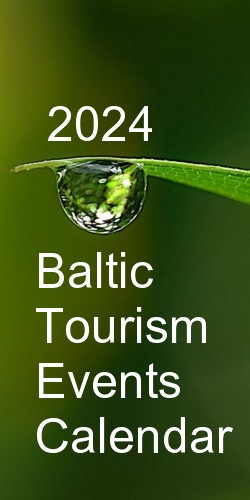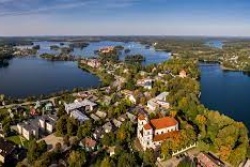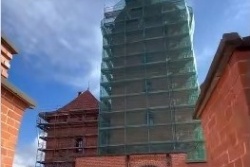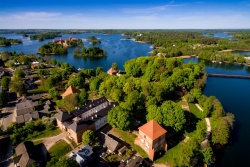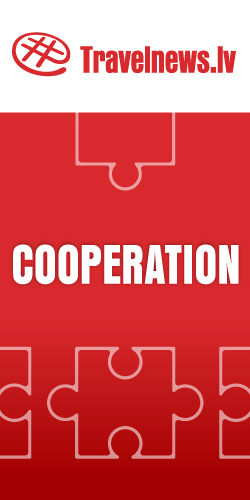Next year, Plunge will inherit the title of the Lithuanian Capital of Culture from Zarasai. In the national competition Lithuanian Capital of Culture 2009 organised by Public Enterprise Vilnius – European Capital of Culture 2009, this Samogitian town outrivaled 16 cities and towns of Lithuania.
Goal of the project: cultural development of the regions
The jury of the competition Lithuanian Capital of Culture 2009 awarded 91.82 points out of the maximum 100 points to the winning project Plungė Cultural Tourism Routes: From Individuality to Globality. Project Anykščiai: Assembly of Creative Work of High-School Graduates of the Millennium of Lithuania in the City of Culture of Anykščiai was awarded 88.64 points and came second, while project Starlight Sonata of Druskininkai was awarded 86.38 points and came third. The Ministry of Culture will finance the implementation of the winning project.
“I hope that the title of the Lithuanian Capital of Culture will not only have a long-term boost to the cultural life of Plungė but will also bring positive changes to the whole region of Samogitia. The active participation of towns and townships of Lithuania in the competition demonstrated that the idea of the Lithuanian Capital of Culture served its purpose: this project aimed at the creation of a platform for further cultural development, the cherishing of identity and for cultural self-expression of all the regions of the country. Unique creative ideas can of course be implemented without becoming the capital of culture; however, let us hope that the national competition will continue and will become a tradition,” – Elona Bajorinienė, the Director of Public Enterprise Vilnius – European Capital of Culture 2009, said.
Three new routes await visitors
The Deputy Head of the Education, Culture and Sports Division of Plungė Region Municipality Administration and the co-ordinator of Plungė Cultural Tourism Routes: From Individuality to Globality Vida Saukalienė noted that Plungė was going to introduce three cultural tourism routes in June-November 2009, viz. the musical route, the religious route and the cultural route visiting industrial objects. “Since of old, the national religious and modern culture has been firmly intertwined in Plungė. Therefore, the development of new tourism routes is basically the formation of a new centre of tourist attraction by joining the unique landscape, cultural and religious traditions and industrial objects inherited from the Soviet era,” – Vida Saukalienė said.
Project is oriented to the national expanse
The cultural historian and the chairman of the jury that evaluated the applications of the contestants of the Lithuanian Capital of Culture Vytautas Balčiūnas noted that the project of Plungė was very important and valuable, as it not only presented an impressive festival of arts to the public to be held in the town of culture developed by the Oginski Dukes, but also revealed historical routes of culture that linked Plungė, Beržoras, Plateliai, Žemaičių Kalvarija and other townships of this region over the centuries.
“It is highly significant that the project of Plungė – Lithuanian Capital of Culture 2009 is not only meant for the local or regional community but is also oriented to the national cultural expanse. Not only the cultural heritage of Plungė, viz. the European park founded by the Oginskis and the magnificent palace – our Lithuanian Versailles – situated in the midst of the park, but also other objects that will be made relevant with attractive events by the Lithuanian Capital of Culture 2009 deserve the attention of the Lithuanian society,” – Vytautas Balčiūnas emphasised.
According to Vida Saukalienė, the title of the Lithuanian Capital of Culture 2009 will encourage local communities to further develop the culture of Plungė Region by making traditional values relevant and by presenting them in modern shapes and in unconventional places. Project Plateliai: the Most Attractive Tourist Site in Lithuania that won in 2008 competition organised by the Lithuanian State Department of Tourism at the Ministry of Economy and the European Commission proved that Plunge Region could justifiably be proud of its distinctive and unique landscape.
“We are convinced that the new title and the three developed cultural tourism routes will better emphasise the cultural heritage and the deep cultural traditions of Plungė, and that the town will become an attractive cultural tourism centre open to everyone,” – the co-ordinator of the winning project hopes.
Apart from Plungė, cities and towns such as Anykščiai, Druskininkai, Gargždai, Kaunas (2 applications), Mažeikiai, Neringa, Pabradė, Radviliškis, Šiauliai, Šventoji, Telšiai, Trakai, Ukmergė, Varėna, Veliuona and Žagarė have been at the start line of competition Lithuanian Capital of Culture 2009. Projects submitted by them have been evaluated by the jury of independent experts that included the representatives of art and culture, the Seimas and the Government of the Republic of Lithuania, the Association of Local Authorities in Lithuania, tourism and historical heritage as well as other well-known public figures.
On project Plungė Cultural Tourism Routes: From Individuality to Globality
Plungė will introduce the following three cultural tourism routes in June-November 2009:
- Musical route will introduce traditional city festivals, viz. the 11th International Brass Band Festival and the 4th International Mykolas Oginskis Festival that will be supplemented with several new projects. These include brass instrument interpretations with the participation of well-known professional brass musicians led by Per Kristian Svensen (Norway); also, the musical flee-market that will invite young musicians from Plunge and from all over Lithuania who will introduce a wide range of musical interpretations from folklore to modern music. Furthermore, visitors will be invited to the presentation of the joint project of famous musicians originating from Plungė. The audience will enjoy many music performances, open-air exhibitions and exhibitions in unconventional places, such as the territory of Soviet plants, the old water tower of Plungė, near the Gandinga castle hill, etc. The published special calendar of musical and cultural projects will help the town-dwellers and visitors find their way and not get lost among these projects.
- The cultural route visiting industrial objects will invite the visitors to assess light and music installations on the territory of industrial enterprises of Plungė as well as modern art of the artists of Plungė and other Lithuanian cities and town exhibited in bus stations, railway stations and urban bus stops. The roof of the former Stotas Cinema will become the stage for sketches.
- The religious route will include the plenair session of Lithuanian artists in Pakutuvėnai – the site famous for its shrine of St. Anthony of Padua and the Reconciliation Homestead. The visitors can visit the old 18th C. wooden churches of Plungė built in the Baroque style in Gintališkė, Baržoras, Plateliai, Gegrėnai and Alsėdžiai. These churches will become the site for concerts of sacral music and poetry readings. Tours of the two Calvaries in the vicinity of Plungė will also be offered. The 600th Anniversary of the Baptism of Samogitia will be celebrated.
About Plungė
Plungė is a town situated in Northwest Lithuania, the county of Telšiai, some 27 km to the west from Telšiai. It is a regional centre. Presently, the municipality of the region of Plungė has 43,580 residents, including 23,138 town-dwellers and 20,442 villagers.
The origin of the name of the town is not clear; however, it can be traced to the personal name of Plungė. This surname is common in various localities of Lithuania, including Samogitia (Nemakščiai, Palanga, Telšiai, etc.). Most probably the birth of the town was given by a homestead owned by Plungė.
Since of old Plungė has been famous for its music, theatre and dance traditions and folk arts. Plungė was the site of the first music school in Lithuania; it was also the home to the first symphony orchestra (thanks to the Oginski Dukes), and one of the first operettas was staged here. Mikalojus Konstantinas Čiurlionis lived and composed in Plungė.
About national programme Vilnius – European Capital of Culture 2009
National programme Vilnius – European Capital of Culture 2009 approved by the Government of the Republic of Lithuania consists of the following:
- Cultural, art and public events. The programme of 2009 includes almost 800 events, about two thirds of which will be free of charge. These events are included into 120 projects, 90% of which will be premières and 80% will be implemented in co-operation with international organisations and artists from 30 countries. Some 105.38 million LTL are expected to be allocated for the implementation, marketing, communication and administrative costs associated with these projects in 2008-2010 (67.37 million LTL in 2009). The co-ordination of these funds is entrusted to the Ministry of Culture of the Republic of Lithuania and Vilnius City Municipality.
- Development and reconstruction of cultural, art and public infrastructure objects. The Government provided the financing of 188.894 million LTL for these works for 2008-2009. These funds are expected to be used for the construction of the National Art Gallery, for the reconstruction of the Arts Printing House, the Titanikas Centre for Design and Innovation of Vilnius Academy of Arts, the Contemporary Art Centre, the National Philharmonic Hall and the buildings and equipment of major Lithuanian theatres, for getting the parks and squares of the Old Town in trim, and for the adaptation of various objects of culture to the needs of the handicapped.
For more information contact:
Vilma Janulytė
Vilnius – European Capital of Culture 2009
Head of Communication Unit
Tel.: (8 5) 211 2387, 8 615 21287
E-mail: [email protected]
 --------
--------